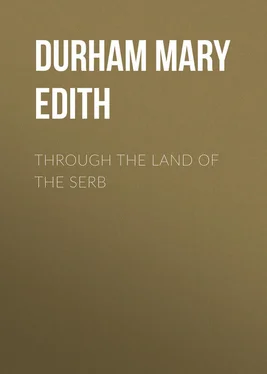Mary Durham - Through the Land of the Serb
Здесь есть возможность читать онлайн «Mary Durham - Through the Land of the Serb» — ознакомительный отрывок электронной книги совершенно бесплатно, а после прочтения отрывка купить полную версию. В некоторых случаях можно слушать аудио, скачать через торрент в формате fb2 и присутствует краткое содержание. Жанр: foreign_antique, foreign_prose, на английском языке. Описание произведения, (предисловие) а так же отзывы посетителей доступны на портале библиотеки ЛибКат.
- Название:Through the Land of the Serb
- Автор:
- Жанр:
- Год:неизвестен
- ISBN:нет данных
- Рейтинг книги:3 / 5. Голосов: 1
-
Избранное:Добавить в избранное
- Отзывы:
-
Ваша оценка:
- 60
- 1
- 2
- 3
- 4
- 5
Through the Land of the Serb: краткое содержание, описание и аннотация
Предлагаем к чтению аннотацию, описание, краткое содержание или предисловие (зависит от того, что написал сам автор книги «Through the Land of the Serb»). Если вы не нашли необходимую информацию о книге — напишите в комментариях, мы постараемся отыскать её.
Through the Land of the Serb — читать онлайн ознакомительный отрывок
Ниже представлен текст книги, разбитый по страницам. Система сохранения места последней прочитанной страницы, позволяет с удобством читать онлайн бесплатно книгу «Through the Land of the Serb», без необходимости каждый раз заново искать на чём Вы остановились. Поставьте закладку, и сможете в любой момент перейти на страницу, на которой закончили чтение.
Интервал:
Закладка:
Everything moves slowly. All day long folk draw water from the stone-topped well on the open space between the old town and the new – draw it slowly and laboriously, for there is no windlass or other labour-saving contrivance, and the water is pulled up in a canvas bag tied to a string. Three or four bagfuls go to one bucket.
In spite of the fact that Podgoritza is the centre of the Anglo-Montenegrin Trading Company and deals in Manchester cottons, the day seems distant when it will lose its other simple habits. I was walking one day down the "High Street" with a friend, when a young Albanian went to call on his tailor. He came out presently with a fine new pair of the tight white trousers that his clan affects. He exhibited them in the middle of the road to two or three friends, and they were all evidently much struck with the make and embroidery. If the garments were so charming "off," what would they be "on"! The whole party hurried across to the shop door of the happy purchaser, and such an alarming unbuckling and untying began to take place that we! discreetly went for a little walk. On our return the transfer had been effected. Two friends were grasping the garment by the front and back, and the wearer was being energetically jigged and shaken into it. This was a tough job, for it was skin-tight. The legs were then hooked-and-eyed up the back, and presently the youth was strutting down the middle of the road stiff-kneed and elegant, with the admiring eyes of Podgoritza upon him, and a ridiculously self-conscious smile.
Wandering gipsy tribes turn up here, too; mysterious roving gangs, their scant possessions, tin pots and tent poles, piled on ponies; their children, often as naked as they were born, perched on top of the load. They have no abiding place; impelled by a primeval instinct, they pass on eternally. Extraordinarily handsome savages some of them are, too. I have seen them on the march – the men in front, three abreast, swinging along like panthers; half stripped, clad in dirty white breeches and cartridges; making up with firearms for deficiency in shirts, and carrying, each man, in addition to his rifle, a long sheath knife and a pistol in his red sash, their matted coal-black locks falling down to their beady, glittering black eyes, which watch you like a cat's, without ever looking you straight in the face. Their white teeth and the brass cases of the cartridges sparkling against their swarthy skins, they passed with their heads held high on their sinewy throats with an air of fierce and sullen independence. Behind follow the boys, women, and children, with all their worldly goods; golden-brown women with scarlet lips and dazzling teeth, their hair hanging in a thick black plait on either side of the face, like that of the ladies of ancient Egypt; holding themselves like queens, and, unlike their lords and masters, smiling very good-naturedly. So entirely do they appear to belong to an unknown, untamed past, that I was astonished when one of them, a splendid girl in tawny orange and crimson, addressed me in fluent Italian outside the Podgoritza inn. "I am a gipsy. Are you Italian?" Italy was her only idea of a foreign land, and England quite unknown to her. She hazarded a guess that it was far off, and imparted the information to a little crowd of Albanian and Montenegrin boys who were hanging around. When the servant of the inn thought the crowd too large, he came out to scatter it. The boys fled precipitately; the girl stood her ground firmly, as one conscious of right, and told him what she thought of him volubly and fiercely, her eyes flashing the while. He retired discomfited, and she informed us superbly, "I told him the ladies wished to speak to me!" Unlike the Montenegrins, she understood at once that we were merely travelling for travelling's sake, and regarded it as perfectly natural. She retired gracefully when she had learnt what she wished to know.
The Montenegrin and Albanian gipsies are mostly Mohammedans, and what is vaguely described as Pagan. They seldom or never, it is said, intermarry with the people among whom they wander, but keep themselves entirely to themselves. One day the old quarter of Podgoritza was agog with a Mohammedan gipsy wedding. From across the river we heard the monotonous rhythmic pulsation of a tambourine, and at intervals the long-drawn Oriental yowl that means music. We strolled down to the bridge and joined the very motley collection of sight-seers. Gay and filthy, they gathered round us, and enjoyed at once the spectacle of two foreigners of unknown origin and the festivity which was going on in the back garden hard by. It could hardly be called a garden, it was the yard of a squalid little hovel backing on the river, and was filled with women in gorgeous raiment walking backwards and forwards in rows that met and swayed apart, singing a long howling chant, while the pom-pom and metallic jingle of the tambourine sounded over the voices with mechanical regularity. Presently all fell aside and left a space, into which leapt a dancing-girl, a mass of white silk gauze with a golden zouave and belt and a dangling coin head-dress. She wreathed her arms gracefully over her head and danced a complicated pas-seul with great aplomb and certainty, her white draperies swirling round her and her gold embroideries flashing in the sunlight. When she ceased, the party withdrew into the dirty little hut, and as we were now the whole attraction to the obviously verminous crowd we withdrew also. The hut was the headquarters of the bridegroom, and this was a preliminary entertainment. Next morning, four carriages dashed into the town at once, bringing the bride and her escort from Skodra in Albania. The horses' heads were decorated with gaily embroidered muslin handkerchiefs, and the bride's carriage was closely curtained and veiled. The amount of men and weapons that poured out of the other vehicles was astounding. When three carriages had unloaded, the bride's carriage drove up close to the entrance of the yard in which the hut stood, and the men made a long tunnel from door to door by holding up white sheets; down this the bride fled safe and invisible, while curiosity devoured the spectators on the bridge. Every window in the hut was already shuttered and barred, and we thought there was no more to be seen.
But our presence had been already noted. A commotion arose among the men at the door of the hovel. A young Montenegrin onlooker came up, pulled together all his foreign vocabulary and stammeringly explained, "They wish you to go into their house." All the men in the crowd were consumed with curiosity about the hidden bride, and obviously envied us the invitation. We hesitated to plunge into the filthy hole. We didn't hesitate long, though. The bride and her friends meant to show off their finery to the foreigners; a dark swagger fellow who would take no denial was sent out to fetch us, and we followed our escort obediently to the cottage door. We paused a half-second on the doorstep; it looked bad inside, but it was too late to go back. A passage was cleft for us immediately, and we found ourselves in a long low room with a mud floor – a noisome, squalid den in which one would not stable an English donkey. There was no light except what came through the small door and the chinks. It was packed with men; their beady, bright eyes and silver weapons glittered, the only sparks of brightness in the gloom.
As my eyes got accustomed to the subdued light, I saw in the corner a huge caldron of chunks of most unpleasant-looking boiled mutton, with floating isles of fat, and my heart sank at the thought that perhaps our invitation included the wedding breakfast. The men guarding the door of the inner apartment parted, and we went in. No man, save the bridegroom, entered here. It was a tiny hole of a room, but its dirty stone walls were ablaze with glittering golden embroideries and it was lighted by oil lamps. The floor was covered with women squatting close together, their brown faces, all unveiled, showing very dark against their gorgeous barbaric costumes. It was a fierce jostle of colours – patches of scarlet, orange, purple and white, mellowed and harmonised by the lavish use of gold over all, coin head-dresses, necklaces, and girdles in reckless profusion. In the light of common day it would doubtless resolve itself into copper-gilt and glass jewels, but by lamplight it was all that could be desired. On a chair, the only one in the room, with her back to the partition wall, so as to be quite invisible to the men in the next room, sat the bride, upright, motionless, rigid like an Eastern idol. Her hands lay in her lap, her clothes were stiff with gold, and she was covered down to the knees with a thick purple and gold veil. There she has to sit without moving all day. She may not even, I am told, feed herself, but what nourishment she is allowed is given her under the veil by one of the other ladies. At her feet, cross-legged on the ground, sat the bridegroom, who I believe had not yet seen her – quite the most decorative bridegroom I ever saw, a good-looking fellow of about five-and-twenty, whose black and white Albanian garments, tight-fitting, showed him off effectively, while the arsenal of fancy weapons in his sash gave him the required touch of savagery. He gazed fixedly at the purple veil, endeavouring vainly to penetrate its mysteries, and, considering the trying circumstances in which he was placed, seemed to be displaying a good deal of fortitude. The air was heavy with scented pastilles, otherwise the human reek must have been unbearable.
Читать дальшеИнтервал:
Закладка:
Похожие книги на «Through the Land of the Serb»
Представляем Вашему вниманию похожие книги на «Through the Land of the Serb» списком для выбора. Мы отобрали схожую по названию и смыслу литературу в надежде предоставить читателям больше вариантов отыскать новые, интересные, ещё непрочитанные произведения.
Обсуждение, отзывы о книге «Through the Land of the Serb» и просто собственные мнения читателей. Оставьте ваши комментарии, напишите, что Вы думаете о произведении, его смысле или главных героях. Укажите что конкретно понравилось, а что нет, и почему Вы так считаете.












